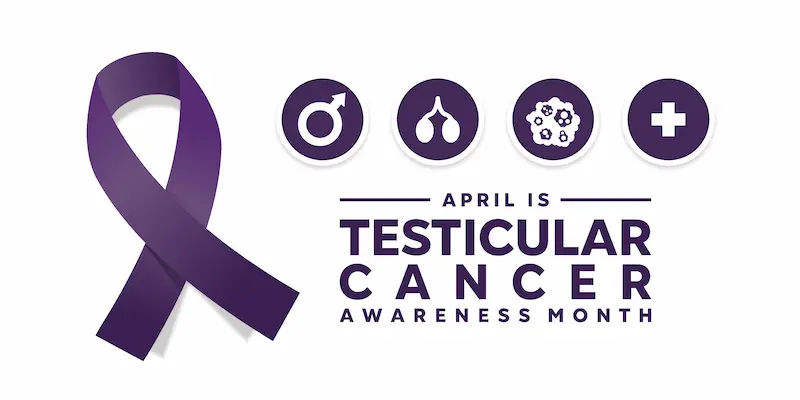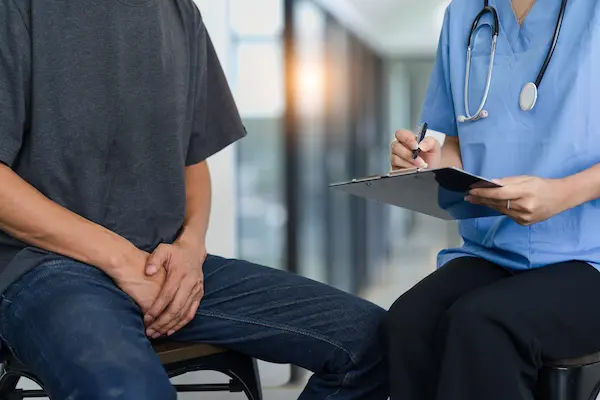Guide to Testicular Cancer Can Reduce Sperm Production You Need
Learn how testicular cancer and its treatments can impact sperm production and fertility. Get essential information on preservation options and managing your reproductive health.

Written by Dr. Shaik Abdul Kalam
Reviewed by Dr. Mohammed Kamran MBBS, FIDM
Last updated on 6th Oct, 2025

Introduction
Receiving a testicular cancer diagnosis is a life-altering event that brings a whirlwind of concerns, with treatment and survival rightly being the immediate priority. However, for many men, especially those in their prime reproductive years, a pressing question quickly follows: "Will I still be able to have children?" The direct answer is that testicular cancer and its necessary treatments can significantly reduce sperm production. But this isn't the end of the story. Modern medicine offers powerful solutions for preserving fertility, and many men go on to have biological children after successful treatment.
This guide will walk you through exactly how testicular cancer affects sperm production, the impact of different therapies, and the crucial steps you can take to protect your future family dreams. We'll cover everything from the science behind sperm creation to the practicalities of sperm banking and the realistic prospects for recovery. Understanding these factors empowers you to have informed discussions with your healthcare team and make decisions that align with your long-term goals.
How Testicular Cancer Directly Impacts Sperm Production?
To understand the problem, we first need to understand how sperm is made. The testes have two primary jobs: producing testosterone and producing sperm.
The Role of the Testes in Sperm Creation
Sperm production, known as spermatogenesis, is a delicate and continuous process happening within tiny tubes in the testicles called seminiferous tubules. This process is highly sensitive to changes in the body's environment, including temperature, hormone levels, and overall health.
Cancer's Disruption of Normal Function
Even before any treatment begins, a man with testicular cancer may already have a reduced sperm count. There are several reasons for this:
Physical Disruption: The growing tumor can disrupt the architecture of the testicle, compressing the seminiferous tubules and hindering sperm production.
Systemic Effects: The body’s immune response to cancer can create a fever-like state or release substances that impair sperm creation in both the affected and the healthy testicle.
Hormonal Imbalances: Some testicular cancers themselves can produce hormones that interfere with the pituitary gland's signals, which are essential for triggering sperm production.
The Effect of Tumor Markers on Fertility
Certain testicular cancers produce protein markers like human chorionic gonadotropin (HCG) or alpha-fetoprotein (AFP). High levels of HCG, in particular, can suppress the brain's signals to the testicles, leading to a direct decline in sperm production. A semen analysis at diagnosis often reveals subfertility, highlighting the importance of proactive fertility assessment.
Health Topic Carousel:
Doctor Speciality: General Physician
Text: Consult Top Specialists
How Cancer Treatments Affect Male Fertility?
While the cancer itself can cause issues, the treatments are the primary factors that can reduce sperm production. The effect depends on the type and intensity of therapy.
Radical Inguinal Orchiectomy (Surgical Removal)
This surgery, which removes the affected testicle, is the first step in treating nearly all testicular cancers. The body can often compensate with the remaining healthy testicle, which may increase its sperm production. However, if the remaining testicle is not fully healthy, sperm count may remain low.
The Impact of Chemotherapy on Sperm Count
Chemotherapy drugs are designed to kill rapidly dividing cells, which is why they are effective against cancer. Unfortunately, sperm cells are also rapidly dividing, making them collateral damage. Chemotherapy can drastically reduce sperm count, sometimes to zero (azoospermia). The risk depends on the type and dose of drugs. Regimens containing high doses of cisplatin carry a higher risk of long-term infertility.
Radiation Therapy and Testicular Function
Radiation is targeted, but scatter radiation can reach the remaining testicle, even when shielding is used. This exposure can impair sperm production. The degree of damage is directly related to the radiation dose the testicle receives.
The Effect of Retroperitoneal Lymph Node Dissection (RPLND)
This complex surgery can sometimes damage the nerves responsible for ejaculation, leading to a condition called retrograde ejaculation (where semen enters the bladder instead of exiting the penis). While this doesn't affect sperm production itself, it prevents sperm from being delivered, posing a significant barrier to natural conception.
Your Most Important Step: Fertility Preservation Before Treatment
The single most effective action you can take to safeguard your fertility is to bank sperm before starting cancer treatment.
What is Sperm Banking (Cryopreservation)?
Sperm banking, or cryopreservation, is the process of freezing and storing sperm samples in a specialized lab. These samples can be kept viable for decades and used later for assisted reproductive procedures like Intrauterine Insemination (IUI) or In Vitro Fertilization (IVF).
The Sperm Banking Process Explained
The process is straightforward and should be discussed with your oncologist immediately after diagnosis.
1. Referral: Your doctor will refer you to a fertility clinic or sperm bank.
2. Consultation and Testing: You'll have a consultation and likely provide a sample for analysis to check sperm count and quality.
3. Sample Collection: You'll provide one or more semen samples through masturbation in a private room at the clinic.
4. Freezing and Storage: The samples are processed, mixed with a protective solution, and frozen in liquid nitrogen tanks.
If you are diagnosed with testicular cancer, ask your oncologist about a referral for fertility preservation immediately. Apollo24|7 can help you connect with specialists who can guide you through this time-sensitive process.
The Road to Recovery: Sperm Count After Treatment
Sperm production can recover after treatment, but it's a gradual process with a variable timeline.
Realistic Timelines for Sperm Production to Return
Spermatogenesis cycle takes about 70-80 days. After chemotherapy or radiation, it can take significant time for the process to restart.
Recovery typically begins within 6 months to 2 years after treatment ends.
For some men, especially after high-dose chemotherapy, recovery can take 3-5 years or may be permanent.
It is crucial to use contraception until your oncologist confirms it is safe to try to conceive, as chemotherapy can damage sperm DNA immediately after treatment, potentially leading to birth defects.
Factors That Influence Fertility Recovery
Pre-treatment sperm count: Men who banked sperm before treatment had a better starting point.
Type and dose of treatment: Higher doses of chemo/radiation increase the risk of permanent infertility.
Age: Younger men generally have a better chance of recovery.
Health of the remaining testicle.
If Natural Conception Isn't Possible: Exploring Other Paths to Fatherhood
Even if sperm production doesn't return to levels sufficient for natural conception, there are still pathways to parenthood.
Assisted Reproductive Technologies (ART) with Banked Sperm
If you banked sperm, options are excellent. A single vial of frozen sperm can be used for IVF with Intracytoplasmic Sperm Injection (ICSI), where a single sperm is injected directly into an egg. This has high success rates even with low sperm numbers.
Options When No Sperm Was Banked
If no sperm was banked and you have azoospermia, options include:
Testicular Sperm Extraction (TESE): A minor surgical procedure to extract sperm directly from the testicular tissue. Sperm found can be used with IVF/ICSI.
Using Donor Sperm: Using sperm from a known or anonymous donor.
Adoption: Building a family through adoption.
Proactive Steps for Your Fertility Future
1. Talk Early: Discuss fertility concerns with your oncologist before any treatment begins.
2. Bank Sperm: View sperm banking as a standard part of your cancer care plan.
3. Follow Up: After treatment, see a urologist or reproductive specialist for a semen analysis to assess your fertility status. Apollo24|7 offers convenient home collection for a wide range of diagnostic tests, and you can consult a specialist online to discuss the need for follow-up semen analysis.
4. Seek Support: Don't underestimate the emotional toll. Consider joining a support group or speaking with a counselor.
Conclusion
The journey through testicular cancer is challenging, but concerns about fertility should not add unnecessary fear. While it is true that the disease and its treatments can reduce sperm production, the medical field has made incredible strides in fertility preservation and restoration. By taking proactive steps—primarily, sperm banking before treatment—you can secure a viable option for biological fatherhood in the future. Remember, recovery is possible for many, and even when it isn't, alternative paths to parenthood are available and successful. The key is to be informed, advocate for your future self with your medical team, and access the support available to you. Your focus should be on beating cancer, knowing that you have taken steps to protect your dreams beyond it.
Health Topic Carousel:
Doctor Speciality: General Physician
Text: Consult Top Specialists
Frequently Asked Questions (FAQs)
1. What are the chances of having kids after testicular cancer?
A. The chances are very good, especially if you bank sperm before treatment. Studies show that about 50-70% of men who attempt conception after treatment are successful, often with the help of assisted reproductive technologies. The success rate is highest for those who preserved sperm.
2. How long after chemotherapy does it take for sperm count to recover?
A. Sperm count recovery can begin within 6 months but often takes 2 to 5 years after chemotherapy ends. The timeline varies greatly depending on the drugs and doses used. Your doctor will recommend follow-up semen analyses to monitor recovery.
3. Is sperm banking expensive, and is it covered by insurance?
A. Costs vary, but many fertility clinics offer discounted rates for cancer patients. Insurance coverage is inconsistent; it's essential to check with your provider. Some non-profit organizations also offer financial assistance for fertility preservation for cancer patients.
4. Can I still father a child naturally with one testicle?
A. Yes, many men can. The remaining testicle often compensates by increasing sperm production. However, it's not guaranteed. A semen analysis after recovery is the only way to know for sure if your sperm count is sufficient for natural conception.
5. If my sperm count is low after recovery, what are my options?
A. Even with a low sperm count (oligospermia), techniques like In Vitro Fertilization (IVF) with Intracytoplasmic Sperm Injection (ICSI) are highly effective. This procedure requires only a few viable sperm to attempt fertilization.
Consult Top Specialists for Personalised Tips

Dr. Vivek D
General Physician
4 Years • MBBS
Bengaluru
PRESTIGE SHANTHINIKETAN - SOCIETY CLINIC, Bengaluru

Dr Syed Mateen Pasha
General Physician
2 Years • MBBS
Bengaluru
PRESTIGE SHANTHINIKETAN - SOCIETY CLINIC, Bengaluru

Dr. Syed Ismail Ali
General Practitioner
7 Years • MBBS
Hyderabad
Apollo 24|7 Clinic, Hyderabad

Dr. Harshendra Jaiswal
General Physician/ Internal Medicine Specialist
12 Years • MBBS , MD (General medicine)
Kolkata
108 DHANA DHANVANTARI Clinic, Kolkata
(25+ Patients)
Dr. Thandra Ramoji Babu
General Physician/ Internal Medicine Specialist
5 Years • MBBS, DNB(General Medicine)
Warangal
Sai Ram multi-specialty hospital, Warangal
Consult Top Specialists

Dr. Vivek D
General Physician
4 Years • MBBS
Bengaluru
PRESTIGE SHANTHINIKETAN - SOCIETY CLINIC, Bengaluru

Dr Syed Mateen Pasha
General Physician
2 Years • MBBS
Bengaluru
PRESTIGE SHANTHINIKETAN - SOCIETY CLINIC, Bengaluru

Dr. Syed Ismail Ali
General Practitioner
7 Years • MBBS
Hyderabad
Apollo 24|7 Clinic, Hyderabad

Dr. Harshendra Jaiswal
General Physician/ Internal Medicine Specialist
12 Years • MBBS , MD (General medicine)
Kolkata
108 DHANA DHANVANTARI Clinic, Kolkata
(25+ Patients)
Dr. Thandra Ramoji Babu
General Physician/ Internal Medicine Specialist
5 Years • MBBS, DNB(General Medicine)
Warangal
Sai Ram multi-specialty hospital, Warangal




